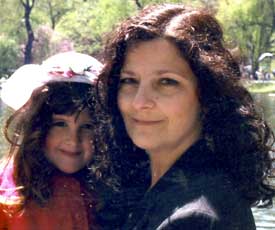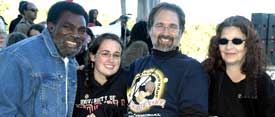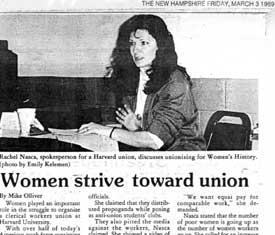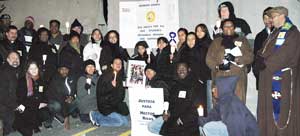
Nasca with daughter Hannah Marshall
Kirschbaum-Nasca on Mother’s Day 1993.
WW photo: Stevan Kirschbaum |
In 1972 Rachel moved into a 42-unit tenement owned by a notorious Boston slumlord. She organized low-income and elderly tenants into the Lorraine Terrace Tenant Union. When the slumlord sought a rent increase she organized the tenants to take over the hearing at the Rent Control Board. Armed with jars of trapped cockroaches, canisters of leaked rusty water and fallen plaster, tenants “presented” their evidence by releasing roaches, water and plaster before horrified hearing examiners.
While she was the LTTU president, the group organized 19 other buildings owned by the slumlord, stopped several rent increases, and won an historic rent decrease. At this period she met and joined Workers World Party. Over the next 30 years she was an organizer and leader of the Boston branch and a member of the party’s National Committee.
Throughout her life she organized in her community, whether in Mission Hill to reclaim a vacant lot and force the city to build a playground, or building community solidarity with the many labor struggles of the day.

Leon Swain, left from AFSCME L. 1072 at
2004 Million Worker March in D.C., with
Hannah Kirschbaum-Nasca, Stevan
Kirschbaum and Rachel Nasca.
WW photo: Liz Green |
In 1996 her Archdale Roslindale neighborhood—labeled by the media “Boston’s Love Canal”—was inundated by a toxic sewage overflow. A 12-block area was covered with a river of waste and fuels, cresting at 8 feet and causing millions of dollars in damages to this working class community. She organized, founded and led the Archdale Roslindale Coalition, representing 209 families in this multinational neighborhood in a nine-year battle. The result was over $4 million in infrastructure improvements to the neighborhood and $6 million in restitution to the families, as well as “seed” monies to establish ARC as a permanent community group.
Staunch defender of union/worker rights
In July 1973 she got a job as a clerical worker in the major Boston law firm of Foley, Hoag and Elliot (FHE). She organized the secretaries, file-room clerks and messengers into a union drive, although there was a virtual legal ban on unions for law-firm workers. The Massachusetts division of the National Labor Relations Board refused jurisdiction for election certification and unfair labor practices. Rachel and Barry Wilson, a young law librarian who would later become a well-known people’s attorney, were elected to negotiate with management. The two were fired but the organizing continued. In an historic 1979 decision the board overturned the ban, ruling that the FHE workers had full rights to unionize.

|
In 1977 Rachel got a job at Harvard University as an administrative clerk to progressive scientist Richard Levins and renowned geneticist Richard C. Lewontin, where she worked until her death. She was a founding member of the Harvard Union of Clerical and Technical Workers, now AFSCME 3650. She walked countless picket lines and coordinated solidarity for Harvard kitchen workers and janitors.
Though not formally a member of Boston School Bus Drivers Union USW Local 8751, her contributions were extraordinary and unique. She played a decisive role in the union’s founding and throughout its over 30-year history. She organized Community/Labor Solidarity Committees during every strike, planned and built Safety Summits of parents and the community and meticulously chronicled USW Local 8751’s history in photos, media articles, releases, leaflets, bulletins, buttons, placards and more from day one.
During the 1978 strike the union negotiating committee was jailed for defying a School Committee-initiated court injunction outlawing the strike. Rachel organized the partners of the jailed, the children, families and supporters for a much-publicized takeover of School Committee offices. They demanded the release of the negotiators. They offered to take the negotiators’ place in jail, stating that if the School Committee was not equally committed to getting the children back to school, its members should resign. During every strike she took a leave from her job to work full time for the strikers.

Nasca organized this Memorial Justice Rally,
for Hector Rivas. Rivas was a union school bus
mechanic who died on the job of carbon
monoxide poisoning.
WW photo: Liz Green |
For over 30 years she gave support, solidarity, advice and comfort to USW Local 8751 leaders and members. On March 9, just days prior to the brain hemorrhage that took her life, she helped lead a Memorial Justice Rally for Hector Rivas at the Freeport Bus Yard. Rivas was a union school bus mechanic who died on the job of carbon dioxide poisoning; the union charges the bus company and the city with willful negligence in his death.
‘Say no to racism!’
In the early 1970s, African-American parents sued Boston public schools for systematic racism resulting in a 1974 federal court order to desegregate. A vile racist mobilization with the backing of national bigoted groups gripped Boston. Rachel organized and participated in the many local anti-racist protests and marches to defend self-determination for Boston’s African American community. Rachel and her comrades initiated the Emergency Committee for a National Mobilization Against Racism, which brought out 25,000 marchers to Say No to Racism, the largest march of its kind since the 1963 March on Washington led by Dr. Martin Luther King Jr.
Rachel marched in countless local and national protests against racism. She was a leading organizer of the march of 10,000 that drove the Klan out of City Hall Plaza. She also fought against racist government frame-ups and for freedom for political prisoners from Mumia Abu-Jamal to Leonard Peltier to the Puerto Rican liberation fighters. Since 1981, Rachel had organized for every National Day of Mourning in Plymouth, Mass., where each year Native American activists tell the real story of the invasion of their land by the Pilgrims.
Women’s liberation and the struggle against sexism
From her arrival in Boston in 1968, she fought for women’s liberation, organizing “consciousness-raising” groups, demonstrating for women’s reproductive rights, defending abortion clinics, fighting for equal pay for comparable work. She protested against the government’s forced sterilization campaign against the women of Puerto Rico and built solidarity with her sisters behind prison walls. She was a leader of the Boston Defense Committee for JoAnn Little, who was falsely charged with murder in the death of a racist prison guard attempting to rape her.
On Dec. 30, 1994, when clinic workers were murdered at Planned Parenthood and Preterm women’s clinics, within the hour she joined defenders at the scene to denounce the national right-wing terrorist campaign against abortion clinics and doctors. With her party comrades she made every International Women’s Day a day of struggle and education. In March 2006 she initiated the IWD women and girls’ contingent in the March 18 March and Rally to Stop Poverty, Racism, Sexism and War on the third anniversary of the U.S. invasion and occupation of Iraq.
She believed in and practiced building bridges of solidarity, uniting struggles against the common enemy. She was therefore most proud of the formation of the Women’s Fightback Network, born on the streets in September 2001 with a People’s Speakout in downtown Boston against the war frenzy, racism and sexism. As its mission states, “WFN is committed to uniting with our sisters and brothers at home and abroad in the struggle to end war, poverty, racism, sexism, and lesbian, gay, bisexual and transgendered oppression.” This militant, fighting women’s organization has now become a national network.
Anti-war activist and internationalist
Rachel was committed in principle and practice to world revolution. She stood with the Palestinian people in their fight to free their land and defended Arab activists from racist frame-ups. This past summer she helped to organize a Boston demonstration protesting the U.S./Israeli invasion of Lebanon. From Puerto Rico to Colombia to Iraq, Afghanistan and India, she felt the workers’ struggle knows no borders.
In fall of 2005 the Boston Rosa Parks Human Rights Day Committee was founded to win Dec. 1 as a national holiday in honor of this civil rights pioneer. On Dec. 1 of that year, some 2,000 people, nearly three-quarters youth of color, took to the streets under the banner of the committee in what was also an anti-war protest. Rachel proudly served on the steering committee.
Working class chronicler, teacher, historian
Rachel was a chronicler of the struggles she participated in. She devoted her formidable research and presentation talents to developing the revolutionary skills and learning of her comrades and sisters and brothers in the struggle. She loved preparing educational reports for Party branch meetings, conferences, workshops and study groups. She most enjoyed working with her sisters in the movement and particularly with the younger revolutionaries, gaining strength and insight from their creativity and zeal and sharing her years of struggle experience.
Those who knew and worked with Rachel knew her as a meticulously organized woman who carried out tasks with rock-solid discipline. She waged the struggle with intense passion and formidable skills and talents, all given 100 percent to the struggle of the workers and oppressed. She lived her beliefs. She had a deep burning love and caring for her comrades, friends and family.
That fire will indeed be missed. She was always consumed with the need to finish a task once started. It now falls to us to struggle to finish her most cherished task, that of building a workers’ world. We can draw strength from the fact that Rachel’s life gave us a glimpse of the future socialist woman.
Rachel Nasca is survived by her daughter, Hannah Marshall Kirschbaum-Nasca, and lifelong partner Stevan Kirschbaum. There will be a memorial for Rachel Nasca at 4 p.m. on April 21 at the Painters Union hall at 25 Colgate Rd., Roslindale, Mass.
Articles copyright 1995-2007 Workers World. Verbatim copying and distribution of this entire article is permitted in any medium without royalty provided this notice is preserved.
Workers World, 55 W. 17 St., NY, NY 10011
Email: ww@workers.orgSubscribe wwnews-subscribe@workersworld.netSupport independent news http://www.workers.org/orders/donate.php 
